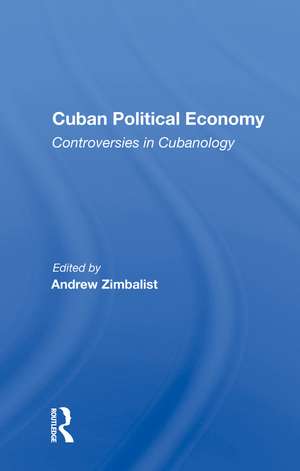Cuban Political Economy: Controversies in Cubanology
Editat de Andrew Zimbalisten Limba Engleză Hardback – 7 iun 2019
Preț: 767.38 lei
Preț vechi: 1104.65 lei
-31% Nou
Puncte Express: 1151
Preț estimativ în valută:
146.86€ • 152.75$ • 121.24£
146.86€ • 152.75$ • 121.24£
Carte tipărită la comandă
Livrare economică 14-28 aprilie
Preluare comenzi: 021 569.72.76
Specificații
ISBN-13: 9780367014162
ISBN-10: 0367014165
Pagini: 256
Dimensiuni: 146 x 229 mm
Greutate: 0.63 kg
Ediția:1
Editura: Taylor & Francis
Colecția Routledge
Locul publicării:Oxford, United Kingdom
ISBN-10: 0367014165
Pagini: 256
Dimensiuni: 146 x 229 mm
Greutate: 0.63 kg
Ediția:1
Editura: Taylor & Francis
Colecția Routledge
Locul publicării:Oxford, United Kingdom
Cuprins
Preface -- Cuban Political Economy and Cubanology: An Overview -- The Antecedents and Theoretical Characteristics of Cubanology -- Cubanology and Cuban Economic Performance -- Interpreting Cuban Planning: Between a Rock and a Hard Place -- Cubanology and the Provision of Basic Needs in the Cuban Revolution -- Some Thoughts on Vital Statistics and Health Status in Cuba -- On the Problem of Studying Women in Cuba -- The Sovietization of Cuba Thesis Revisited -- Why Cuban Internationalism? -- Revolution and Paradigms: A Critical Assessment of Cuban Studies -- Cubanology and Crises: The Mainstream Looks at Institutionalization
Descriere
This comprehensive and authoritative book assesses in theoretical and empirical terms some of the most widely debated issues in the study of Cuban political economy over the past two decades. Contributors discuss the Cuban economy's rate of growth, structural changes that have accompanied economic development, the extent of Cuba's economic and political dependence on the Soviet Union, the reliability of Cuban statistics, the performance of Cuba's system of central planning, and the progress Cuba has made in promoting equality for women. Without extolling or condemning the Castro government, these essays provide a timely analysis of the methods, theoretical approaches, and conclusions of the literature in Cuban studies since the 1960s and offer a new understanding of the Cuban reality.
